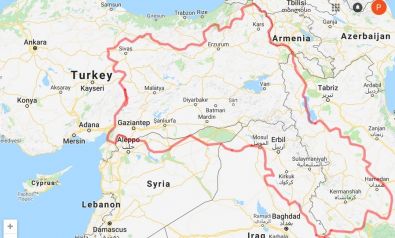After Turkey Complains, Google Removes Offending ‘Kurdistan’ Map

Google has evidently taken down a user-generated map depicting the boundaries of the historical Kurdistan region, following demands by the Turkish government after a lawmaker complained the map served as “terrorist propaganda.”
The map had been created on Google My Maps, a customized service, by a user who described it as showing the location of “a geo-cultural region wherein the Kurdish people have historically formed a prominent majority population.”
But on Thursday typing in the URL for the page where the map previously appeared instead brought up an error message:
“Unavailable. This map is no longer available due to a violation of our Terms of Service and/or policies,” it reads.
A search for maps of “Kurdistan” brought up only the semi-autonomous region by that name in Iraq, and the Iranian province of the same name.
The Turkish state is highly sensitive about anything that can be seen as supportive of claims for autonomy for the Kurds.
Of the estimated 35 million Kurds worldwide, around half live in Turkey, where they account for 19 percent of the total population. The boundaries of historical Kurdistan – as depicted on the now-removed Google map – include a huge swathe of eastern Turkey.
The rest of the contiguous region incorporates a large part of what is today northern Iraq, a sizeable piece of north-western Iran, and territory in northern and north-eastern Syria.
Apart from the Kurds in Turkey, according to the CIA World Factbook between six and eight million Kurds live in Iraq (15-20 percent of the population), and the Minority Rights Group International estimates the Kurdish population of Iran at eight million and that of Syria at 2.5 million.
According to the Kurdish media network Rudaw, guidelines adopted by Turkey’s parliament in mid-2017 banned the use of the terms “Kurdistan” and “Kurdish regions” (as well as “Armenian genocide.”)
Months later a Kurdish lawmaker was suspended after using the word “Kurdistan” on the parliament floor, it said.
For three decades the Kurdistan Workers’ Party (PKK) has been fighting a separatist struggle against the Turkish state, and is considered by Turkey, the U.S. and the European Union as a terrorist group.
In Syria, however, Kurdish YPG fighters – deemed to have links to the PKK – have been some of the most effective U.S. allies in the fight against ISIS.
Turkish President Recep Tayyip Erdogan strongly opposes the existence of de facto autonomous Kurdish territory near the Syria-Turkey border, worried that it could boost separatism among Kurds inside Turkey.
As U.S. troops prepare to withdraw from Syria on President Trump’s orders, Erdogan is gearing up for a military offensive against the YPG fighters.
Turkey’s demand to Google came from Transport and Infrastructure Minister Cahit Turan, after he was challenged in parliament by a nationalist lawmaker, Yavuz Agiralioglu, who charged that the map violated Turkey’s national borders.
“These maps and their likes which serve as terrorist propaganda should be removed,” Agiralioglu said, probably in reference to groups like the PKK and YPG.
In response, Turan told parliament earlier this week that officials with the government’s Information and Communication Technologies Authority had taken up the matter with Google representatives, pressing for the map’s urgent removal as part of the platform’s obligations under national and international laws.
The Kurds are the world’s largest ethnic group that does not have a state of its own, and achieving one would mean a rewriting of national borders dating back a century.
The present-day borders in the region are the legacy of a secret Anglo-French agreement in 1916 to divide the crumbling Ottoman Empire into British and French zones of influence, leading to what would become today’s Iraq, Syria, Lebanon, Jordan and Israel.
As occurred elsewhere in the world, the colonial carve up in the region often ignored tribal, ethnic or sectarian realities, laying the foundation for conflicts that persist to this day.
The Kurds lost out, and subsequent attempts at self-determination were violently crushed in Turkey and Iran. In Iraq, Saddam Hussain’s infamous “Anfal” campaign cost tens of thousands of Kurdish lives, including 5,000 killed with outlawed chemical weapons in 1988.
Queries sent to Google’s media office about the map’s removal brought no response by press time.
While Google’s reasoning for apparently complying with Turkey’s demand is not known, among its terms and policies is a reference to suspension of services “to comply with applicable law.”
Elsewhere, the policies say the map creation service “is not meant to be a forum for general political, social commentary, or personal rants. Content that does not meet this standard will be removed.”
There is also a general prohibition of content that “[i]ncites hatred against, promotes discrimination of, or disparages an individual or group on the basis of their race or ethnic origin, religion, disability, age, nationality, veteran status, sexual orientation, gender, gender identity, or other characteristic that is associated with systemic discrimination or marginalization.”